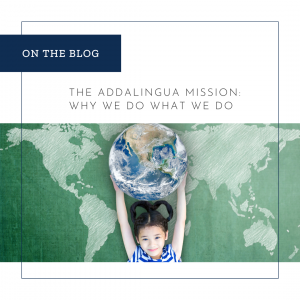
The Czech proverb, “As many languages you know, as many times you are a human being,” perfectly summarizes the reason we dedicated the last twenty plus years to dual language immersion education.
Why? We believe that multiplying the number of languages students acquire while in school might also multiply the number of opportunities they have to experience being human. But what defines “being human” or the “human experience?” Many experts agree, what sets our experience apart from other living things is our ability to feel a wide range of emotions and to empathize. To empathize means we can imagine and identify with the thoughts and feelings of others. It’s also agreed that empathy is so important because it can lead to compassion. Compassion, in turn, can lead to taking action for the good of others, a vital part of society and community.
What does language have to do with empathy? Though all humans are born with the capacity to empathize, psychologists will tell you that empathy is a learned behavior that needs to be developed. For most humans, language development goes hand in hand with emotional and cognitive development. Just read two essays written by the same student, one from kindergarten and one from twelfth grade and you’ll see what we mean. If one language increasingly expands the ways in which students can express and interpret their own and others’ thoughts and emotions, what does developing two languages do? As former educators and school leaders in Spanish dual language immersion schools, we had the privilege of observing hundreds of students “do school” in two languages.
Does developing two languages increase empathy? Research points to the possibility, and we’ve observed it in action. Our students seemed to take in new information and consider it from different perspectives. They wrote stories showcasing characters with complex feelings and insights. They also seemed to develop friendships characterized by differences rather than similarities. They showed interest in people who dressed in clothing different from their own and spoke different languages, smiling and turning toward such groups during field trips. It was as if our students were expanding their capacity to not simply empathize, but to empathize globally, across linguistic, cultural, and ethnic differences.
On October 4, 2017, INC Magazine published an article entitled “Why Empathy is the Most Important Skill You’ll Ever Need to Succeed: To do your job well (or even to get a job), technical skills are no longer enough. Of all the soft skills, empathy is the one you will need the most.” We couldn’t agree more.
In a Skillstalk article by Ana Isabel Alonsagay, she states “Empathy may be the most important business skill.” She elaborates in the article that, in fact, empathy boosts collaboration, increases productivity and competitive edge, and leads to customer and employee satisfaction.
In a survey by The Empathy Business, the top 10 most empathetic workplaces generated 50% more earnings than those in the bottom 10. Through a workplace culture of healthier, more understanding and respectful communications – employees can work more effectively to keep their company ahead of the curve.
Bottom line: The great Fred Rogers said many, many years ago: “We want to raise our children so that they can take a sense of pleasure in both their own heritage and the diversity of others.” To us, the journey begins with a clear plan for developing empathy in even the youngest of school-aged learners. Through dual language immersion education, we have a genuine and proven opportunity to make THAT world — one in which we truly see one another and honor each other for who we are as humans — a real possibility. If you’re ready to start your school’s journey toward global empathy, please reach out. We’d love to chat.
Learn more by watching our Language First webinar: link here.


